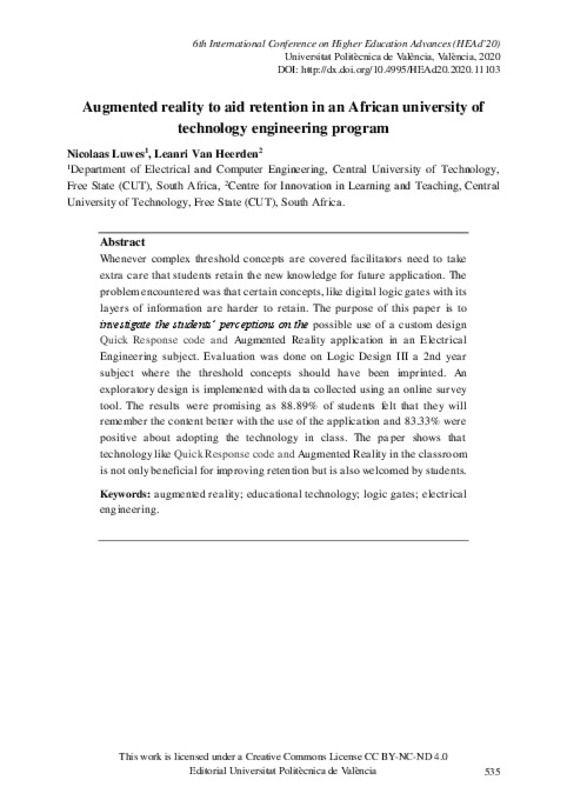JavaScript is disabled for your browser. Some features of this site may not work without it.
Buscar en RiuNet
Listar
Mi cuenta
Estadísticas
Ayuda RiuNet
Admin. UPV
Augmented reality to aid retention in an African university of technology engineering program
Mostrar el registro sencillo del ítem
Ficheros en el ítem
| dc.contributor.author | Luwes, Nicolaas
|
es_ES |
| dc.contributor.author | Van Heerden, Leanri
|
es_ES |
| dc.date.accessioned | 2020-06-09T06:09:34Z | |
| dc.date.available | 2020-06-09T06:09:34Z | |
| dc.date.issued | 2020-04-28 | |
| dc.identifier.isbn | 9788490488119 | |
| dc.identifier.issn | 2603-5871 | |
| dc.identifier.uri | http://hdl.handle.net/10251/145783 | |
| dc.description.abstract | Whenever complex threshold concepts are covered facilitators need to take extra care that students retain the new knowledge for future application. The problem encountered was that certain concepts, like digital logic gates with its layers of information are harder to retain. The purpose of this paper is to investigate the students’ perceptions on the possible use of a custom design Quick Response code and Augmented Reality application in an Electrical Engineering subject. Evaluation was done on Logic Design III a 2nd year subject where the threshold concepts should have been imprinted. An exploratory design is implemented with data collected using an online survey tool. The results were promising as 88.89% of students felt that they will remember the content better with the use of the application and 83.33% were positive about adopting the technology in class. The paper shows that technology like Quick Response code and Augmented Reality in the classroom is not only beneficial for improving retention but is also welcomed by students | es_ES |
| dc.language | Inglés | es_ES |
| dc.publisher | Editorial Universitat Politècnica de València | es_ES |
| dc.relation.ispartof | 6th International Conference on Higher Education Advances (HEAd'20) | |
| dc.rights | Reconocimiento - No comercial - Sin obra derivada (by-nc-nd) | es_ES |
| dc.subject | Higher Education | es_ES |
| dc.subject | Learning | es_ES |
| dc.subject | Educational systems | es_ES |
| dc.subject | Teaching | es_ES |
| dc.subject | Augmented reality | es_ES |
| dc.subject | Educational technology | es_ES |
| dc.subject | Logic gates | es_ES |
| dc.subject | Electrical Engineering | es_ES |
| dc.title | Augmented reality to aid retention in an African university of technology engineering program | es_ES |
| dc.type | Capítulo de libro | es_ES |
| dc.type | Comunicación en congreso | es_ES |
| dc.identifier.doi | 10.4995/HEAd20.2020.11103 | |
| dc.rights.accessRights | Abierto | es_ES |
| dc.description.bibliographicCitation | Luwes, N.; Van Heerden, L. (2020). Augmented reality to aid retention in an African university of technology engineering program. En 6th International Conference on Higher Education Advances (HEAd'20). Editorial Universitat Politècnica de València. (30-05-2020):535-543. https://doi.org/10.4995/HEAd20.2020.11103 | es_ES |
| dc.description.accrualMethod | OCS | es_ES |
| dc.relation.conferencename | Sixth International Conference on Higher Education Advances | es_ES |
| dc.relation.conferencedate | Junio 02-05,2020 | es_ES |
| dc.relation.conferenceplace | València, Spain | es_ES |
| dc.relation.publisherversion | http://ocs.editorial.upv.es/index.php/HEAD/HEAd20/paper/view/11103 | es_ES |
| dc.description.upvformatpinicio | 535 | es_ES |
| dc.description.upvformatpfin | 543 | es_ES |
| dc.type.version | info:eu-repo/semantics/publishedVersion | es_ES |
| dc.description.issue | 30-05-2020 | |
| dc.relation.pasarela | OCS\11103 | es_ES |








